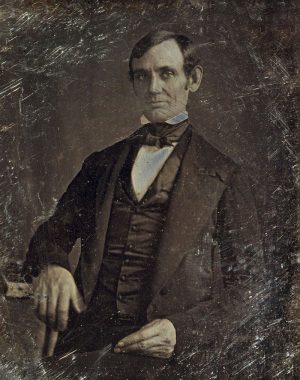Abraham Lincoln was born in 1809 to an illiterate father and a mother who only had basic reading skills. Lincoln himself did not receive extensive formal education. According to the sixteenth president of the United States, he only attended school every now and then. In 1858, he even described his formal education as “flawed.”
When he was nominated for the presidency of the United States in 1860, he felt sad about his meager formal schooling. He attended school only occasionally, so his formal education amounted to only a year. Lincoln did not go to college either. He was self-educated and sustained his appetite for independent learning all his life. Lincoln’s stepmother, Sarah, described him as a boy who was always reading something and had a fascination with learning. Even as an adult, Lincoln continued to read to improve himself as a person, studying books on English grammar and immersing himself in the Greek mathematician Euclid when he served in Congress.
Learning as a Young Boy
A cousin of Lincoln’s mother named Dennis Hanks claimed he was the one who first taught Lincoln how to read and write. Hanks said he handed Lincoln a quill feather he had taken from a buzzard that he had shot with a rifle. Then he said he guided the young boy’s hand to give him the feeling of what writing was like.
Lincoln was six years old when he and his sister started to go to a school located two miles away from their home in Knob Creek. It was a subscription school, and it conducted classes only a few months out of the year. When Lincoln was seven years old, his father moved the family to Indiana. Here, there were no schools, so Lincoln and his sister continued their learning by simply reading books at home. In 1819, a school opened just over a mile away from the Lincolns’ home, and both Lincoln and Sarah were able to resume their formal education.
However, the school did not satisfy Lincoln’s huge appetite for learning. It was common for him to borrow books from his neighbors, and he was even known to read books twice when he wanted to memorize excerpts that captivated his imagination. His father liked the idea that young Lincoln was attending school but was annoyed at the young boy’s continuous reading, especially when he was expected to work around the house. And so, in an attempt to stop his son’s non-stop reading, his father hid his son’s books and even threw away some of them. This only caused Lincoln to feel bitter toward his father. This bitterness was made worse when his father started to hurt him physically as punishment for reading when he was supposed to be doing house chores.
Once, his father slapped young Lincoln when he tried to correct his father’s account of a story. When Lincoln left his father’s house at the age of twenty-two, his father was reported to have mockingly said that his son may still be deluding himself with education. He said that he tried to stop his son’s foolishness but failed to get it out of the young boy’s head. He added that if his son would stop wasting his time on books, he might achieve something important.
The young Lincoln’s schoolmates and neighbors remembered him as an insatiable reader, poring over books like the Bible, Robinson Crusoe, Aesop’s Fables, spelling books, and newspapers. Later, Lincoln studied Shakespeare and British history. Lincoln stood at six feet and four inches and looked very strong, and his neighbors thought he was lazy for wasting all that physical size and strength on books and writing.
Lincoln’s aggressive self-education did not stop with reading. He also developed a manner of speaking that reflected his upbringing in the backwoods. He trained himself to speak in the voice of the common man by conversing with his fellow townspeople and schoolmates. When he reached his early twenties, he was already an articulate and smooth-speaking orator. Some historians disagree with this, though, and say that even as a politician, Lincoln’s manner of speaking was still coarse.
Self-Taught Attorney
It was not hard to become an attorney during Lincoln’s time, but he still underwent hardships in becoming one. In 1837, there were not that many law schools, and most students educated themselves in Law by studying under an attorney for three years and then taking the bar exam, which was nothing but oral back then. Meanwhile, Lincoln only borrowed books from a local attorney and studied legal cases intensively. He took on different kinds of casual jobs throughout his studies to sustain himself. Because he was at a disadvantage because he was self-taught, it took Lincoln four years instead of three before receiving his license. Lincoln had a sharp memory, but his mind was not as fast. It took his mind a while before he was able to grasp the concept at hand. Lincoln himself said that he was slow to understand, but he retained the material in his mind for a long time. He said further that his mind was like steel — hard to etch something on it, but near-impossible to erase the etchings on it.
As a Member of Congress
When he was serving in the House of Representatives, his friends thought it was hilarious that Lincoln spent his free time reading books inside the Library of Congress. However, his self-education enabled him to grow a scholarly power that showed its force in his speeches and writings. His power of speech was driven by his sound arguments and the well-founded knowledge he had learned through his non-stop reading.
